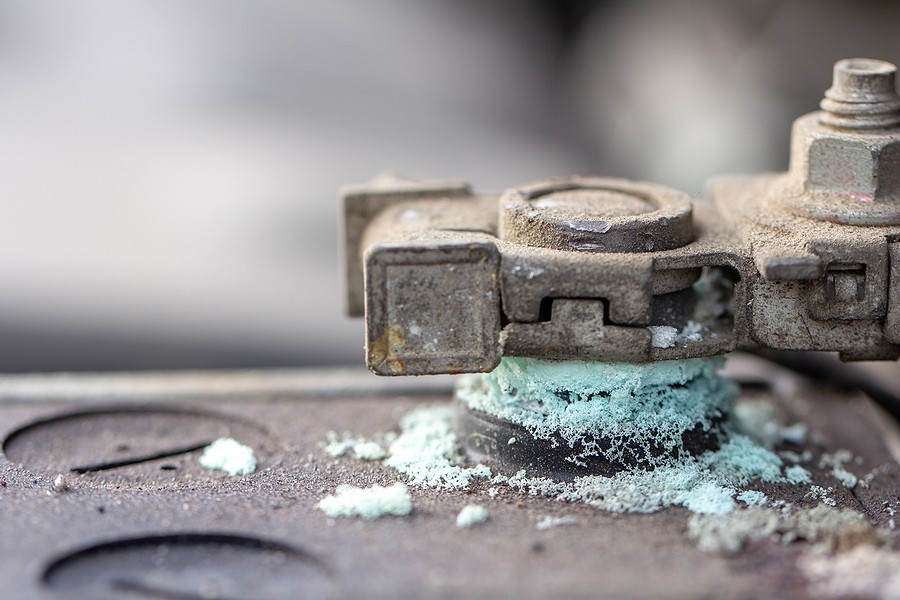Nobody wants the stress of a car that won’t start, especially when you’re in a hurry. Car batteries are essential, but they don’t last forever. Typically, a car battery’s lifespan is between three and five years. This can vary based on factors like climate, driving habits, and the specific vehicle model. Many drivers only realize their battery needs replacing when problems become unavoidable.
 Close-up photo of an old car battery
Close-up photo of an old car battery
Are you wondering if you can squeeze another year out of your current battery after a jump start? This guide will walk you through how to tell if your car battery is going bad, helping you recognize the signs before you’re stranded.
1. Battery Terminal Corrosion
One of the most visible indicators of a failing car battery is corrosion on the battery terminals. Open your car’s hood and inspect the points where the battery cables connect to the positive and negative terminals. If you notice a powdery, blue-green substance or crystal-like build-up on these terminals, it’s a strong indication that your car battery is deteriorating. While you can clean battery terminal corrosion, its presence often signals battery acid leaks and underlying issues. This is a clear sign you should consider a car battery replacement soon.
2. Swollen or Warped Battery Case
Just as a swollen phone battery is a cause for alarm, a bulging or warped car battery case is a serious warning sign. A healthy car battery case is typically rectangular with flat sides. If you observe any swelling, cracking, or bulging in the battery case, it suggests internal damage, often due to heat or overcharging. An oddly shaped battery case is a visual cue that something is significantly wrong and could lead to battery failure.
3. Rotten Egg Smell Under the Hood
A pungent sulfur smell, often likened to rotten eggs, emanating from under your car’s hood is a significant indicator of battery trouble. This odor is caused by leaking battery acid. As a car battery ages and deteriorates, it can produce hydrogen sulfide gas, which carries that distinct rotten egg smell. If you detect this smell, it’s crucial to have your car battery checked immediately as battery acid leaks can cause further damage to your vehicle.
4. Dim or Flickering Headlights
A weakening car battery can manifest in electrical issues, including noticeably dimmer headlights. If you observe that your headlights are not as bright as usual, especially at night or when idling, it could be a sign that your battery is struggling to provide sufficient power. Similarly, flickering headlights can also indicate inconsistent power delivery from a failing battery. These headlight symptoms are often early indicators of battery problems.
5. General Electrical System Issues
A dying car battery often leads to a range of electrical problems throughout your vehicle. These issues can affect various components, from the dashboard to accessories.
Here are some common electrical issues that can point to a bad car battery:
- Weak or Non-functional Heated Seats: If your heated seats are not working or are significantly weaker than usual, it could be due to insufficient power from the battery.
- Erratic Dashboard or Radio: Intermittent or complete failure of your dashboard lights or car radio can be a sign of power delivery issues related to the battery.
- Flickering or Dim Dashboard Lights: Similar to headlights, dashboard lights that flicker, dim, or fail to illuminate properly can indicate a battery problem.
- Slow or Non-responsive Power Windows: If your electric windows are operating slowly or not at all, it may be due to a lack of power from a weakening battery. The sunroof can also be affected.
- Phone Charging Problems: If your cell phone struggles to charge when plugged into your car’s charging port, it could point to a broader electrical issue stemming from the battery.
While each of these electrical issues individually might not definitively point to a bad battery, experiencing several of them in combination warrants a battery check.
6. Clicking Sounds When Turning the Key or Slow Engine Crank
When you turn the ignition key, a healthy car battery provides the necessary charge to the starter motor, which then cranks the engine. If your battery is weak, you might hear a rapid clicking sound when you turn the key. Alternatively, the engine might crank very slowly, or “turn over” sluggishly. These are common symptoms of insufficient battery power to effectively engage the starter. Ignition clicking is often a key sign of a low battery charge, though it can also indicate issues with the starter or alternator.
Differentiating Battery, Starter, and Alternator Problems
It’s important to distinguish between battery problems and issues with the starter or alternator, as they can sometimes present similar symptoms.
Alternator Issues: A failing alternator can mimic many dead battery symptoms, such as dim headlights, electrical problems, difficulty starting, and frequent battery drain. However, a key indicator of an alternator problem is often the illumination of the alternator warning light (often shaped like a battery) on your dashboard. Additionally, you might hear unusual rattling or grinding noises if the alternator is failing. If you are considering a battery replacement, it’s wise to have your alternator checked as well, especially if symptoms persist after replacing the battery.
Starter Issues: A bad starter motor typically presents a different set of symptoms. When you attempt to start the car, you might hear a single click sound instead of the rapid clicking associated with a bad battery. The engine will likely not crank or turn over at all. In some cases, you might hear a grinding noise or even see smoke emanating from the starter motor area when trying to start the car.
If you replace your battery and starting problems continue, it is crucial to consult a mechanic to diagnose and address potential starter or alternator issues.
7. Frequent Jump Starts
If you find yourself needing to jump-start your car more and more frequently, this is a clear indication that your battery is struggling to hold a charge and is likely nearing the end of its lifespan. This is particularly true if your battery is older than three years. While jump-starting can temporarily revive a weak battery, it’s not a long-term solution and frequent jump starts point towards the need for a battery replacement.
8. Check Engine Light Illumination
The check engine light can signal a wide array of issues, and a failing car battery is among them. While not always indicative of battery problems alone, a check engine light, especially when combined with other symptoms mentioned above, can suggest a dying battery. It’s always advisable to have your car checked by a professional when the check engine light comes on, regardless of other symptoms, to ensure proper diagnosis and prevent further issues.
In regions with extreme climates, like Florida with its intense heat, car batteries can degrade faster. High under-hood temperatures can significantly shorten battery life. If you live in a hot climate, you may need to replace your car battery more frequently, possibly every three years instead of five, to avoid unexpected battery failures. If you suspect your battery is failing, consider professional battery replacement services to ensure reliable vehicle operation.
